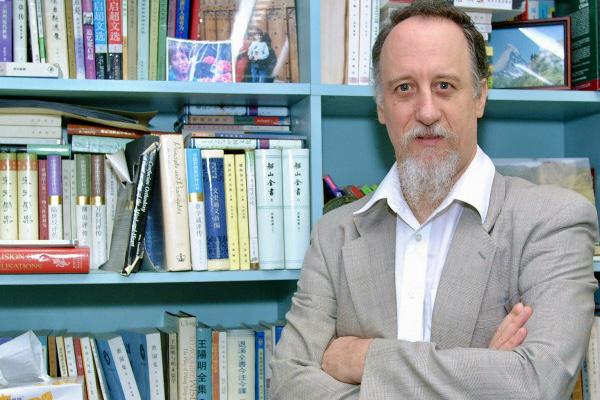Professor Lauren Pfister, rector of Hephzibah Mountain Aster Academy and professor emeritus of Hong Kong Baptist University, delivered an online presentation titled "Contemporary Interdisciplinary Explorations of Matters Related to the Teaching and Reception of Foreign Theological Works in Greater China."
The presentation was part of the publicly accessible session "Teaching Philosophical and Sinological Perspectives" at the "Theological Reception Histories in Modern & Contemporary China" seminar and workshop held at Chung Chi College, the Chinese University of Hong Kong (CUHK), on December 20-21, 2024. Chaired by Professor Lai Tsz Pang John from CUHK's Department of Cultural and Religious Studies via Zoom, the session explored the implications of theological reception histories for seminary teaching and academic research.
In his presentation, Professor Pfister discussed six key topics: his academic background and hermeneutic transformations; exploring cultural understandings of theological worldviews; questioning Ruist and modern voluntarism with Christian gracious moral cultivation; transformative dimensions in Chinese biblical theology; Ruist (儒家) and Christian Shengren (圣人, sages and saints); and interdisciplinary theological challenges presented by three recently published major books.
Pfister highlighted his interdisciplinary academic journey, which was deeply influenced by his cross-cultural experiences in Hong Kong and other parts of Greater China. A pivotal moment was his study of James Legge, the missionary scholar whose work translating Confucian texts into English laid the foundation for Pfister's perspective, incorporating 19th-century Scottish realism and Qing dynasty Confucianism.
Drawing from Rosenstock-Huessy's definition of culture as "the dynamic and tensed time-space unity constituted by the values and institutions by which people live," Pfister emphasized that culture is a living, complex entity subject to both growth and decline. He explored how Christian theology operates within cultural frameworks, articulating absolute passion for the Absolute through both written and lived expressions. He also pointed out potential pitfalls, including the lack of relevance of academic theology to Christian communities, insensitive translations, and a misunderstanding of internet connectivity's role in cultural comprehension.
Addressing voluntarism, he noted its roots in both modern self-help attitudes and the Confucian classic Zhong Yong or the Doctrine of the Mean. While voluntarism has inspired many, it often neglects divine relationships and communal support, potentially leading to burnout and emotional distress. He suggested that Christian gracious moral cultivation could address these challenges by emphasizing spiritual family and divine connection.
On transformative dimensions in Chinese biblical theology, Pfister discussed how cultural transformations can lead to significant changes in theological expressions. He identified four areas for reflection: theological applications to family structures, spiritual communities and institutions, linguistic contexts beyond Putonghua, and Chinese Christians in non-Chinese cultural settings.
Regarding "Shengren," Pfister compared the Ruist concept of sages with the Christian understanding of saints. In Ruist traditions, sages achieve wisdom and insight through study and meditation, while Christian saints receive grace and salvation through divine relationships. Despite these differences, Pfister suggested a possible convergence, identifying figures like Xu Guangqi and Zhang Juzheng as saintly sages and contemporary Christian leaders like Xu Songshi and Vernon Grounds as sage saints. He elaborated on this topic further during the Q&A session.
Pfister concluded by presenting interdisciplinary challenges from three recent books, particularly "The Oxford Handbook of Postcolonial Biblical Criticism" edited by R.S. Sugirtharajah. He critiqued the politicization of biblical studies in postcolonial discourse and highlighted the underrepresentation of Christian theologies of the southern hemisphere in Chinese contexts. He called for greater engagement with works by theologians there to enrich Chinese theological discourse and enhance its global relevance.
Responding to Pfister, Professor Lai Pan Chiu, from CUHK's Department of Cultural and Religious Studies, appreciated Pfister's call to go beyond the binary framework of China and the West, emphasizing that integration should involve all cultures surrounding China and that Christianity is not just a Western religion.
He emphasized the need for mutual exchange between Chinese and Western theological traditions. While Chinese theologians have largely translated Western works with localized adaptations, there has been limited contribution to global theological discussions. Lai called for a clearer vision of how Chinese theology can engage with and contribute to the broader Christian tradition.
In his sharing, Lai encouraged undergraduate students to view Christianity as a global religion and incorporate resources from Buddhism, Taoism, and Confucianism into theological discussions. For postgraduate and post-doctoral students, he stressed the importance of making critical responses to theological works and utilizing traditional Chinese cultural resources to contribute to contemporary theological debates.












